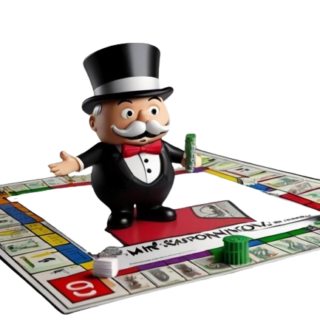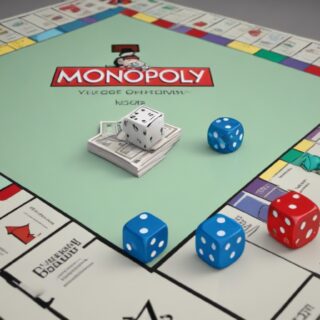Understanding Monopoly’s Income Tax Rules
Income tax is an unavoidable part of life, even in the world of Monopoly. In this classic board game, the Income Tax space can be a game-changer, affecting your financial strategy and overall success. Let’s delve into the rules and implications of income tax in Monopoly:
What is the goal of Monopoly
The goal of Monopoly is to become the wealthiest player by buying, renting, and selling properties.
The Income Tax Space
- Location: The Income Tax space is located on the game board between the Pennsylvania Railroad and the St. James Place properties.
- Options: When a player lands on the Income Tax space, they have two options:
- Pay $200: The player can choose to pay a flat fee of $200 to the bank.
- Pay 10%: Alternatively, the player can pay 10% of their total net worth (including cash, properties, and buildings) to the bank. However, the player must pay at least $200, even if 10% of their net worth is less than that amount.

Calculating Net Worth
To calculate your net worth for income tax purposes, add up the following:
- Cash on hand.
- The total purchase price of all mortgaged and unmortgaged properties you own.
- The cost price of all buildings you own (houses and hotels).
- The price at which you can mortgage properties.
Strategic Considerations
- Cash Management: It’s important to manage your cash flow carefully to ensure you can cover expenses like income tax when they arise.
- Mortgaging Properties: If paying 10% of your net worth would be more than $200, consider mortgaging properties to reduce the amount you owe.
- Timing: Landing on the Income Tax space at a strategic moment can sometimes be advantageous, especially if you’re able to liquidate assets or mortgage properties to cover the cost.
House Rules and Variations
- Some house rules may alter the income tax rules, such as setting a flat fee for all players or allowing players to choose between paying a flat fee or a percentage of their net worth.
- It’s important to agree on the income tax rules before starting the game to avoid confusion or disputes during gameplay.
Who is the winner in Monopoly?
In Monopoly, the Income Tax space requires a player to pay either $200 or 10% of their total net worth (including cash, properties, and buildings), whichever is less. This rule may vary slightly depending on the edition or house rules being used.
Optional Rules and Variations
- Speed Die: A third die can be added to speed up the game.
- House Rules: Players can agree to certain house rules, such as free parking money, different starting money amounts, or different auction rules.
Conclusion
Income tax in Monopoly adds an element of financial strategy to the game, requiring players to manage their assets and cash flow effectively. By understanding the rules and implications of income tax, players can develop a more strategic approach to financial management and increase their chances of success in this classic board game.
What comes with the game
Here’s a table outlining the components included in a standard Monopoly game:
| Component | Description |
|---|---|
| Game Board | The board consists of 40 spaces representing properties, railroads, utilities, and special spaces like Chance and Community Chest. Players move around the board buying properties and collecting rent. |
| Tokens | Tokens represent players on the board and include classic items like the thimble, top hat, and car. Players choose a token at the beginning of the game. |
| Money | Monopoly money comes in different denominations and is used to buy properties, pay rent, and manage finances throughout the game. |
| Property Deeds | Deeds represent ownership of properties and include information such as purchase price, rent cost, and building costs. Players collect deeds when they buy properties. |
| Houses and Hotels | Players can purchase houses and hotels to increase rent on their properties. Houses are placed on properties to indicate rent increases, and hotels replace houses for higher rent. |
| Chance and Community Chest | These cards are drawn when a player lands on the corresponding space. They contain instructions that can be beneficial or detrimental to the player, such as paying or receiving money, or moving to a different space on the board. |
| Dice | Monopoly uses two six-sided dice for movement around the board. Players roll the dice to determine how many spaces to move on their turn. |
| Banker’s Tray | The banker manages the game’s money and properties. The banker’s tray includes compartments for the different denominations of money and property deeds. |
| Rules | The rulebook outlines how to play the game, including setup, gameplay, and winning conditions. It also includes information on optional rules and variations. |
| Mortgaged Property Cards | When a property is mortgaged, a card is placed on the property to indicate that it cannot collect rent until the mortgage is paid off. Players can mortgage properties to raise funds. |
| Houses and Hotels Tokens | These tokens are used to represent houses and hotels when purchased by players. They are placed on properties to indicate the level of development and the increased rent value. |
FAQ
Monopoly can be played with 2 to 8 players.
The goal of Monopoly is to become the wealthiest player by buying, renting, and selling properties.
The last player remaining in the game, who has not gone bankrupt, is the winner.
You go bankrupt in Monopoly if you cannot afford to pay rent, buy a property, or pay a fine.
If you choose not to buy a property when you land on it, it goes to auction and is sold to the highest bidder.
Players can trade properties with each other to complete color groups and gain strategic advantages.
: Chance and Community Chest cards are special cards that players draw when they land on the corresponding spaces. They contain instructions that can be beneficial or detrimental to the player.
Yes, you can mortgage properties to raise funds. When you mortgage a property, you receive money from the bank but cannot collect rent on that property until the mortgage is paid off.
You can get out of jail in Monopoly by paying a fine, using a “Get Out of Jail Free” card, or rolling doubles on your turn.
The starting amount of money varies depending on the number of players, but it is typically $1500 per player in a standard game.
Ready to roll the dice and take on the challenge of becoming the ultimate property tycoon?
Set up the board, and let the wheeling and dealing begin!
Time to buy, sell, and trade your way to victory in the timeless game of Monopoly.
Who will build the biggest empire and bankrupt their opponents? Find out now by starting your Monopoly adventure


